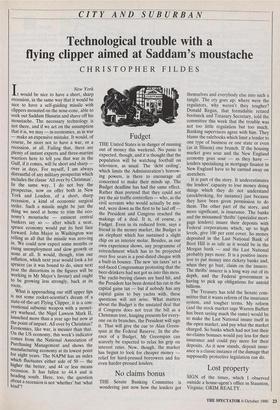No claims bonus
THE Senate Banking Committee is wondering just now how the lenders got themselves and everybody else into such a tangle. The cry goes up: where were the regulators, why weren't they tougher? Donald Regan, that formidable retired bootneck and Treasury Secretary, told the committee this week that the trouble was not too little regulation but too much. Banking supervisors agree with him. They blame the rulebooks which limit a lender to one type of business or one state or even (as in Illinois) one branch. If the housing market goes sour and the New England economy goes sour — as they have — lenders specialising in mortgage finance in New England have to be carried away on stretchers.
It is part of the story. It underestimates the lenders' capacity to lose money doing things which they do not understand (stockbroking, for instance) just because they have been given permission to do them. The other part of the story, and more significant, is insurance. The banks and the misnamed 'thrifts' (specialist mort- gage lenders) insure their deposits with Federal corporations which, up to high levels, give 100 per cent cover. So money deposited in the Last National Bank of Boot Hill is as safe as it would be in the Morgan bank — and the Last National probably pays more. It is a positive incen- tive to put money into rickety banks and, when they go bust, claim on the insurer. The thrifts' insurer is a long way out of its depth, and the Federal government is having to pick up obligations for untold billions.
The Treasury has told the Senate com- mittee that it wants reform of the insurance system, and tougher terms. My reform (and the stock market sage Warren Buffett has been saying much the same) would be to make the Last National insure itself in the open market, and pay what the market charged. So banks which had not lost their no-claims bonuses would pay less for their insurance and could pay more for their deposits. As it now stands, deposit insur- ance is a classic instance of the damage that supposedly protective legislation can do.


















































 Previous page
Previous page